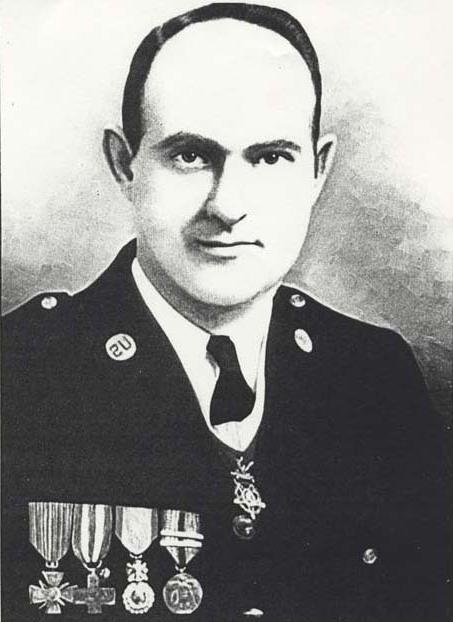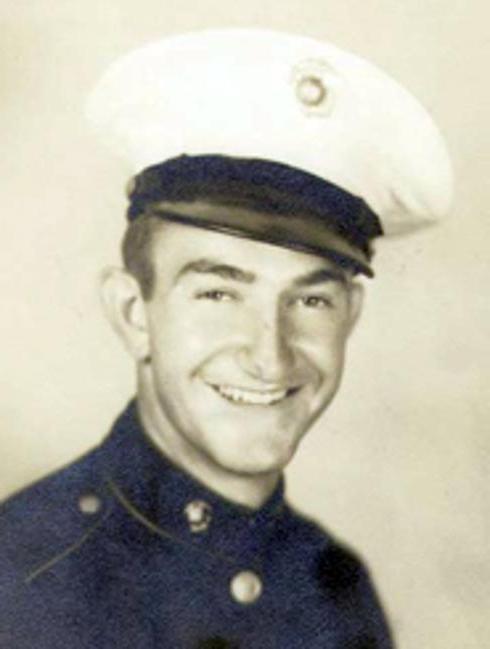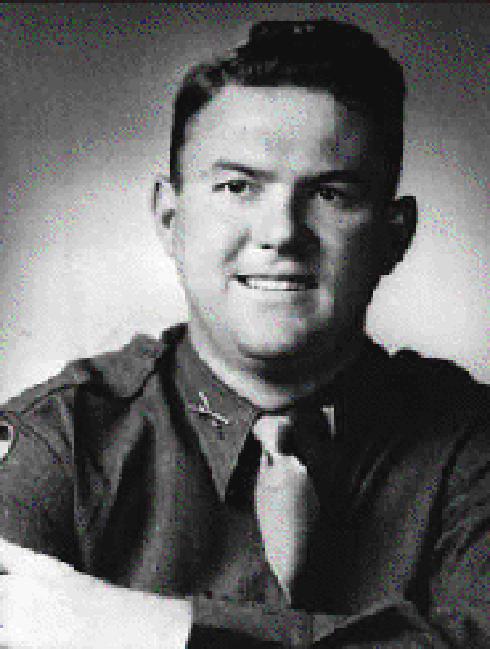War Memorial Court: Medal of Honor recipients

Of the millions of men and women who have served in the U.S. armed forces throughout history, only about 3,400 have received the Medal of Honor, America's highest award for valor. Among those few are eight Virginia Tech alumni.
The number is particularly significant considering that a little more than half of the nation's medals were awarded during the Civil War, before Virginia Tech's founding.
The eight names are etched in a marble cenotaph, a symbolic tomb, at the center the court above War Memorial Chapel
Antoine August Michel Gaujot and Julien Edmund Victor Gaujot
Antoine Gaujot, Class of 1900, and Julien Gaujot, Class of 1893, are two of the few brothers to earn the Medal of Honor and the only pair to receive the medal for actions in different wars.
Antoine Gaujot received the medal for actions as an Army corporal at the Battle of San Mateo in 1899 during the Philippine Insurrection. He made persistent effort under heavy enemy rifle fire to locate a ford to help his unit cross the swollen river to attack. Unable to accomplish this, he swam with a companion again under fire and against a dangerous current across the river to the enemy side. There he secured an enemy canoe and returned it to the friendly side of the river.
Julien Gaujot, an Army captain, received the medal for actions on the Mexican Border in 1911. He is the only soldier awarded the medal for peacekeeping actions. In Douglas, Ariz., stray bullets from fighting among Mexican rebels and government troops caused American casualties. Gaujot crossed the border and moved between the two groups of belligerents for an hour under heavy fire. This secured the safe passage of the Mexican soldiers and American prisoners over the border to the United States. His actions saved five Americans taken prisoner by the Mexicans, 25 Mexican soldiers, plus Americans and Mexican rebels who would have died in continued fighting.

Earle Davis Gregory
Earle Gregory, Class of 1923, received the Medal of Honor for actions as an Army sergeant during the Meuse Argonne Offensive along the Western Front in World War I. He is considered the first Virginia veteran from World War I to receive the medal and often was called the “Sergeant York of Virginia.” Armed with a rifle and a mortar shell used as a hand grenade, Gregory single-handedly captured a machine gun and three enemy soldiers. Continuing his advance he captured a howitzer and 19 enemy soldiers.

Herbert Joseph Thomas
Herbert Thomas, Class of 1941, received the Medal of Honor for action on Bougainville Island in the South Pacific in World War II while a Marine Corps sergeant. Through dense jungle and severe machine gun fire, Thomas led his men in destroying two enemy machine gun positions. Halted by a third enemy machine gun, he positioned his men to rush the enemy after he threw a hand grenade. He threw the grenade only to have the jungle vines drop it back among his men. Seeing the danger to his men, he jumped on the grenade, saving their lives with the sacrifice of his own. Thomas Hall is named in his honor.
Jimmie Waters Monteith Jr.

Jimmie Watters Monteith, Jr.
Jimmie Monteith, Class of 1941, received the Medal of Honor for actions as an Army lieutenant at D-Day during World War II. Without regard for his own safety, he led the assault over exposed beach to the cover a narrow ledge. Leaving cover, he moved toward two tanks. Exposed to intense artillery and machine gun fire, he led them through a minefield and directed the tank fire, destroying several enemy positions. He then returned to his men and led them in the capture of an advantageous position. Against vicious enemy counterattacks he repetitively crossed open terrain under heavy fire to strengthen his unit's defense until he was killed. Monteith Hall was named in his honor.
Robert Edward Femoyer
Robert Femoyer, Class of 1944, enlisted in the Army Air Force during World War II and is the only navigator awarded the Medal of Honor. On a bombing mission over Germany, he was wounded by enemy aircraft fire, which seriously damaged his B-17 bomber. Despite extreme pain and great loss of blood, he refused morphine to keep his mental faculties clear. For 2½ hours he guided the lone bomber through six changes in course around enemy anti-aircraft concentrations. As the crippled aircraft crossed safely over the English Channel, Femoyer finally allowed an injection of morphine. Thirty minutes after landing he died of wounds. Femoyer Hall is named in his honor.

Richard Thomas Shea, Jr.
Richard Shea, Class of 1948, received the Medal of Honor for actions as an Army first lieutenant at Pork Chop Hill during the Korean War. Fighting outnumbered, he voluntarily proceeded to the area most threatened to organize and lead a counterattack. During the bitter fighting, he killed two enemy soldiers with his trench knife. In more than 18 hours of heavy fighting, he moved among the defenders of Pork Chop Hill to ensure a successful defense. Leading a counterattack, he killed three enemy soldiers single-handedly. Although wounded, he refused evacuation. He was last seen fighting hand-to-hand during yet another counterattack.

Gary Lee Miller
A unit commander in the U.S. Army, 1st Lt. Gary Lee Miller, Class of 1969, died from wounds he received while serving with the 1st Battalion, 28th Infantry Regiment, 1st Infantry Division, in action in Binh Duong Province, Vietnam.
Miller was serving as a platoon leader at night when his company ambushed a hostile force infiltrating from Cambodian sanctuaries. After contact was broken, Miller led a reconnaissance patrol to search the area for enemy casualties. As the group advanced, it was attacked and Miller seriously wounded. During the fight, an enemy grenade was thrown into the midst of Miller's group. Miller threw himself on it, absorbing the force of the explosion with his body. His action saved nearby members of his patrol.
A resident of Covington, Virginia, Miller attended Clifton Forge-Covington Community College during a period when it was designated a branch of Virginia Tech.
- See a complete list of Medal of Honor recipients throughout the history of the armed forces.
- See a complete list of names engraved on Virginia Tech's Pylons.


